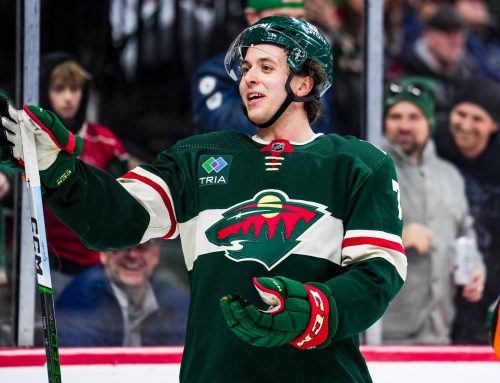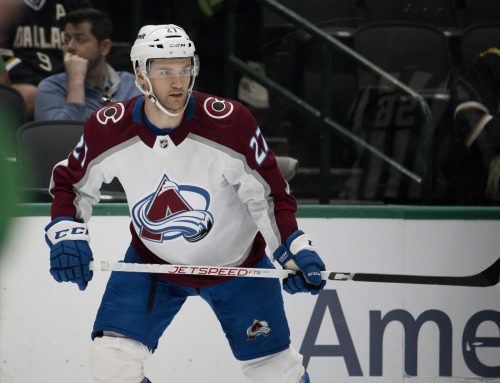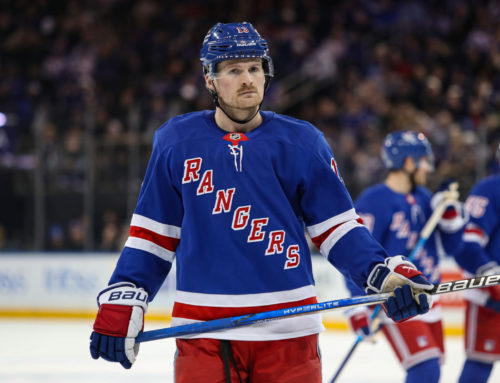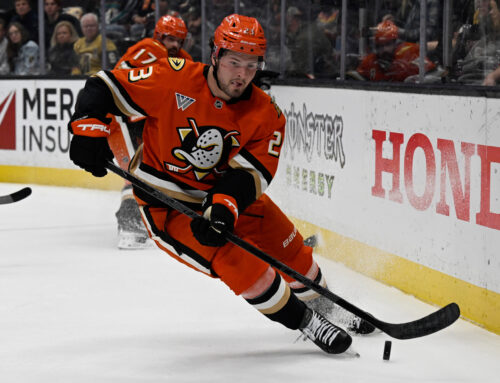
Battling this week are two forwards who were among the hottest in hockey at different points during 2015-16: Mark Scheifele, who’s been on fire of late, and Leon Draisaitl, who was lighting it up earlier. Which one is the best own for 2016-17 and beyond? Time to find out – Cage Match starts now!
Career Path and Contract Status
Scheifele, who just turned 23, was selected 7th overall by the newly rechristened Jets in 2011 after just one OHL season. He returned to the OHL for two more campaigns, piling up 132 points in just 92 games and, in the process, leaving little doubt he was ready for prime time. In his first two NHL campaigns, Scheifele produced well, with a 44 point full season pace in 2013-14 followed by 49 points in 82 games last season. And with his scoring run since the injury to Bryan Little, Scheifele should improve upon his production yet again, as his current full season points pace is 62.
After two seasons in the WHL compiling 163 points in 128 games, Draisaitl, now 20, was selected 3rd overall by the Oilers in 2014. He broke camp with Edmonton in 2014 and played 37 games (tallying nine points), but was returned to the WHL to prevent 2014-15 counting toward his service time in terms of free agency. Although it was no surprise to see Draisaitl back with Edmonton for 2015-16, it shocked nearly all poolies to witness him ignite for 31 points in his first 27 games, only to then see him come back to earth with only 17 in his next 38 contests.
Per Cap Friendly, Scheifele is on the final year of his ELC, counting $0.863M against the cap, while next season will be the last on Draisaitl’s ELC, which dings the cap at a slightly higher $0.925M.
Ice Time
|
Season |
Total Ice Time per game (rank among team’s forwards) |
PP Ice Time per game (rank among team’s forwards) |
SH Ice Time per game (rank among team’s forwards) |
|
2015-16 |
18:07 (M.S.) – 4th 18:04 (L.D.) – 4th |
2:36 (M.S.) – 5th 2:28 (L.D.) – 6th |
0:18 (M.S.) – 11th 0:03 (L.D.) – 11th (tied) |
|
2014-15 |
18:35 (M.S.) – 5th 12:41 (L.D.) – 14th |
2:24 (M.S.) – 5th 1:50 (L.D.) – 9th |
0:03 (M.S.) – 10th 0:00 (L.D.) |
|
2013-14 |
16:21 (M.S.) – 7th |
1:58 (M.S.) – 5th |
0:02 (M.S.) – 11th |
Seeing how similar Schefele’s Ice Times are for 2014-15 and 2015-16, one would expect comparable production in both campaigns. Yet as noted above he posted 49 points in 2014-15, while this season he’s on target for a 60+ point scoring pace.
To gain added insight, it makes sense to look at Scheifele’s 2015-16 numbers both before and after Little’s final game of the season on February 18th. Beforehand, Scheifele had 29 points in 46 games (full season scoring pace of 51 points) with zero instances of 21:00+ of Ice Time in a game and eleven of less than 16:00, while since then he’s been rolling, to the tune of 17 points in 14 games, with seven instances of 21:00+ of Ice Time and only one of less than 18:59.
Of course, the magic question is what happens when Little returns next season? Scheifele being an RFA and getting a significant raise in the offseason would, in and of itself, stand to earn him a larger role for 2016-17 and thereafter. But beyond that – although Little is a key player for Winnipeg, he’s also a decent trade chip (albeit one with a limited NTC) due to counting only $4.7M per season against the cap and signed only through 2017-18. What we might see is a situation where Scheifele is given a larger role and more responsibility starting next season, not only on the heels of signing a new RFA deal, but also to see if he can make Little expendable. Long story short – it’s fair to assume Scheifele will be put into an Ice Time position to post solid numbers in 2016-17 and beyond.
As for Draisaitl, it’s hard not to like how things are unfolding. After dipping his toes in the water last season, he’s firmly entrenched himself in the Edmonton top six and, despite their logjam at forward, is producing well overall. Of course, it’s not ideal for Draisaitl to primarily play the same position (center) on the same team as a generational talent in Connor McDavid and another 1st overall selection in Ryan Nugent-Hopkins; however, we’ve seen in places like Pittsburgh, San Jose, Tampa Bay and Boston that squads can have more than one center simultaneously put up fantasy elite output.
Plus, it’s notable that since RNH’s return from injury, he’s been largely relegated to third line center duty despite Draisaitl’s recent struggles. Clearly the Oliers see Draisaitl clicking with Taylor Hall, and that’s a good situation for Draisaitl to be in. Moreover, assuming that RNH – who seems to be the odd man out at this point – is traded this summer, Draisaitl stands to benefit significantly in the area of PP Ice Time, where RNH ranks above him as of now.
Secondary Categories
|
Season |
PIMs (per game) |
Hits (per game) |
Blocked Shots (per game) |
Shots (per game) |
PP Points (per game) |
FOW (per game) |
|
0.59 (M.S.) 0.30 (L.D.) |
0.82 (M.S.) 0.54 (L.D.) |
0.51 (M.S.) 0.26 (L.D.) |
2.70 (M.S.) 1.87 (L.D.) |
0.13 (M.S.) 0.12 (L.D.) |
6.96 (M.S.) 6.72 (L.D.) |
|
|
2014-15 |
0.29 (M.S.) 0.11 (L.D.) |
1.22 (M.S.) 0.56 (L.D.) |
0.74 (M.S.) 0.21 (L.D.) |
2.07 (M.S.)
📢 advertisement:
1.32 (L.D.) |
0.16 (M.S.) 0.05 (L.D.) |
6.00 (M.S.) 3.46 (L.D.) |
|
2013-14 |
0.22 (M.S.) |
1.00 (M.S.) |
0.62 (M.S.) |
1.58 (M.S.) |
0.06 (M.S.) |
5.25 (M.S.) |
Scheifele’s numbers are generally good across the board – not exceptionally great or terrible in any one category, other than FOW, which is a disaster for a player who, like Scheifele, is center only eligible. It turns out Scheifele has the worst FOW percentage(43.9%) among any forward who sits in the top 50 for faceoffs taken this season. Ouch. But in Scheifele’s defense, his percentage was under 43% in each of his first two seasons, so he’s doing somewhat better as time passes.
Still, we have to always remember that real life hockey can (and often does) interfere with fantasy hockey. In this case, it might be difficult for the Jets to anoint Scheifele a #1 center in real life if he doesn’t find a way to further improve in the faceoff dot. And that, in turn, would likely stand in his way of achieving true fantasy success due to not getting #1 center minutes and opportunities.
Meanwhile, most of the numbers for Draisaitl are so poor that they cannot be excused by him being still a very young player. In both his seasons, Draisaitl’s Hits and Blocked Shots combined were less than just Scheifele’s Hits alone, and Draisaitl’s PIM and SOG are nothing to write home about either.
One area where Draisaitl and Scheifele might be forgiven is on the PP, since both are on squads whose PP% are in the bottom third among NHL teams (Edmonton is 21st, Winnipeg 29th) and each is primarily part of their teams’ PP2. But their poor PP outputs beg the question – how can we explain their 60+ point scoring paces if their PPP rates are subpar, other than perhaps unsustainable good luck?
Well, it turns out that each is excellent in points per 60 minutes at 5×5 this season, with Draisaitl – even after his recent scoring woes –sitting 7th out of 221 forwards who’ve played 750+ minutes at 5×5 and Scheifele at 28th. Among those behind both players are Alex Ovechkin, Evgeni Malkin, Artemi Panarin, and Henrik Sedin to name a few. Not only that – among players in the top 30 other than Draisaitl and Scheifele, only Dylan Larkin (10th) is younger than both, with fewer than a handful of others younger than Scheifele but not Draisaitl. This is data to get excited about if you own Draisaitl or Scheifele in a fantasy league, since PP scoring can come later, whereas P/60 at 5×5 is something poolies hope their players are “born with.”
Luck-Based Metrics
|
Season |
Personal Shooting Percentage |
PDO/SPSV (5×5) |
IPP (5×5) |
IPP (5×4) |
Offensive Zone Starting % (5×5) |
|
2015-16 |
13.9% (M.S.) 14.8% (L.D.) |
1010 (M.S.) 990 (L.D.) |
69.0% (M.S.) 88.1% (L.D.) |
61.5% (M.S.) 57.1% (L.D.) |
52.8% (M.S.) 55.8% (L.D.) |
|
2014-15 |
8.8% (M.S.) 4.1% (L.D.) |
1007 (M.S.) 927 (L.D.) |
58.8% (M.S.) 63.6% (L.D.) |
66.7% (M.S.) 50.0% (L.D.) |
48.9% (M.S.) 79.2% (L.D.) |
|
2013-14 |
13.0% (M.S.) |
1014 (M.S.) |
63.2% (M.S.) |
44.4% (M.S.) |
52.5% (M.S.) |
Scheifele’s Personal Shooting % this season is high, but barely above what he posted as a rookie; plus, his IPPs have room to improve and his OZ% and PDO/SPSV are reasonable. Thus, the complete picture for Scheifele is a player who not only hasn’t benefitted from unsustainable good luck as a whole, but might have room for a few more “lucky bounces” to go his way.
In terms of Draisaitl, what jump out are his high personal Shooting % and an incredibly high 5×5 IPP. Just how high is his 5×5 IPP? It not only puts him second among all 221 forwards who’ve logged 750+ minutes at 5×5 for this season, but would‘ve placed him within the top five among forwards in any of the past five NHL campaigns.
Yet what I’ve learned after having done this column for as long as I have is this – 5×5 IPP is most telling as a stat when it’s either strikingly low for a top six player, or strikingly high for someone who isn’t in the top six. In other words, Draisaitl’s 5×5 IPP, although unquestionably high, isn’t alarming.
Plus, based on past player comparisons, the fact that Draisaitl is posting such a high IPP at 5×5 at his young age bodes incredibly well for his future. Looking at the instances where, in a full season since 2007-08, a player age 21 or younger had a 5×5 IPP that put him in the top ten overall for 750+ minute forwards, we see only five– Sidney Crosby and Kyle Okposo in 2008-09, Jamie Benn in 2009-10, Jordan Eberle in 2011-12, and Taylor Hall in 2013-14. That’s some pretty fine company considering all players have both scored 65+ points in a season, while two have won at least one Art Ross Trophy.
Who Wins?
The match is close enough that before picking a winner, we need to factor in cost vs. value. Scheifele is owned in 66% of Yahoo leagues and, as noted above, is only eligible at center; Draisaitl is 45% owned and comes with C and RW eligibility. That tilts the scales in Draisaitl’s favor, as although neither player has yet to show sustained top production over anything close to a full season, Draisaitl is doing as much at 20 as Scheifele at 23, and while still being owned in fewer leagues. Beyond that, even if Draisaitl ends up as technically the No.2 center in Edmonton behind Connor McDavid, his linemates (particularly Taylor Hall) figure to be just as good as those with whom Scheifele skates – and that’s even if Scheifele ascends to the No.1 center role in Winnipeg, which is not entirely clear given the presence and more complete game (e.g., FOW and SH Ice Time) of Bryan Little.
Although Draisaitl is the winner, I think a case could be made that both are buys in keeper leagues. After all, with neither being owned in more than two-thirds of leagues and with seemingly bright futures ahead of them, chances are the cost to obtain either one would make it worthwhile. If you do make a move to obtain either one, the time might be now for Draisaitl given his comparatively poorer play over the last couple of months. On the other hand, it might be best to wait until the offseason or even the beginning of 2016-17 to land Scheifele, since that way you can point to his season-long totals, and his recent scoring binge will be less fresh on the minds of your fellow GMs.





 CAR
CAR WSH
WSH DAL
DAL WPG
WPG FLA
FLA TOR
TOR MIN
MIN COL
COL VAN
VAN STL
STL
